2005 年江苏南京农业大学英语二外考研真题
Cloze Test
(20 points)
Part I
Directions: For each numbered blank in the following passage, there are 4 choices
marked A), B), C) and D). Choose the best one and mark your answer on the ANSWER SHEET
with the letter A, B, C, or D.
For many Westerners, the Chinese dinner table is “an unknown land”. There are
or knives for the Westerners to use. The Chinese host makes great,
_1 ___
no
3
6
2
of the table pas
sweeping arm movements that go over large
food and friends alike. The
a
how to talk, eat and sit that are highly
is completely different from
dinner was enjoyed with low voices, and the topics open for
restricted. We were not allowed to
If I had to leave the
mentioning what it was
my hands." I would say.
sing over both
is fantastic, but it leaves many foreigners at
for what to do. In most Western restaurants and homes there are rules about
, and they create an atmosphere that
we find here in China. In my childhood home,
were very much
anything that was potentially unappetizing.
to use the toilet, I had to verbally excuse myself without
, please? I need to wash
I was going to do. "
11
10
8
5
7
4
9
Everything must be done as quietly as possible.
mouths closed. If any sound whatever was created by our intake of
(饮料), it constituted bad
to speak with one's mouth full of food, so
had taken in food and swallowed it.
, we had to eat with our
or beverage
! With that in mind, it was, of course, unthinkable
only occurred before or after one
12
13
15
14
When a guest comes from the West to enjoy a meal with you, it would be a good idea
at dinner and to find out if a
chopsticks. In my time in China, I have come to
by my own culture, but for
. The best policy is to ask your guest questions to
for you to explain to your guest what will
fork would be easier to use
enjoy Chinese table manners far more than those
many it is impossible to
find out what he or she is
with.
16
18
17
19
20
C) chopsticks
D) plates
C) sectors
D) sections
1. A) spoons
2. A) areas
3. A) scene
B) forks
B) places
B) table
4. A) question
B) puzzle
C) food
C) loss
5. A) free
6. A) that
B) restrictive
C) active
B) those
C) these
7. A) discussion
B) talking
C) saying
D) host
D) doubt
D) inactive
D) what
D) telling
8. A) bring out
B) bring in
C) bring up
D) bring with
9. A) dinner
10.A) that
B) meal
B) which
C) seat
C) when
D) table
D) why
�
11.A) May I excuse
B) May I be excused
C) Will you excuse
D) Will you be excused
12.A) Moreover
B) However
C) Therefore
D) Meanwhile
13.A) spoons
B) forks
C) chopsticks
14.A) manners
B) ways
C) fashions
D) food
D) types
15.A) washing hands
B) using the toilet
C) asking for leave
D) speaking
16.A) do
17.A) or
B) happen
C) look like
D) serve
B) instead of
C) than
D) rather than
18.A) prescribed
B) preserved
C) prevented
D) prevailed
19.A) adopt
20.A) aware
B) adjust
C) admire
D) acquire
B) interested
C) comfortable
D) accustomed
(40 points)
Reading Comprehension
Part II
Directions: Each of the passages below is followed by some questions or incomplete
sentences. For each question or sentence there are four answers or choices marked A),
B), C) and D). Read the passage carefully and choose the best answer or choice to each
of the questions or incomplete sentences. Then write your answer on the ANSWER SHEET
with the letter A, B, C, or D.
Passage 1
Emmy is from Uganda(乌干达), a country where AIDS is the leading cause of death,
killing more than 300 people a day. He is just one of an estimated 1.7 million
AIDS-related orphans in Uganda, which has the largest number of AIDS orphans of any
country in the world.
Emmy, 20 years old now,
has a simple response when asked about the impact of AIDS
in his homeland: "It left me parentless," he says.
Despite his personal tragedies, Emmy counts himself as among the lucky one in
Uganda. He is optimistic about his future and grateful for the fact he is able to live
in one of Uganda's Daughters of Charity Orphanages.
"Living in the orphanage was a privilege, as most of the orphans in Uganda don't
have anyone to take care of them. When you are in an orphanage, you have someone to
take care of you, you have clothing, shelter. You feel comforted and have friends who
are similar to me," says Emmy.
The person who provided them the most comfort during their years in the orphanage
was a nun named Sister Rose Muyinza, who founded the Daughters of Charity Orphanages
in 1972, with the aim of caring for children who lost their parents to war, AIDS and
other diseases.
It was through his father that Emmy landed in the Daughters of Charity Orphanage.
�
“My dad used to work for the primary school at the orphanage in the capital,
Kampala. He was sick and asked for leave to go home to the northern part of Uganda
as he couldn't manage to work anymore, because he was too weak," Emmy says. "Sister
Rose asked my father to leave me with her. I think she liked me."
Emmy was then five years old.
"At first, when I was young I didn't think about him dying. I just thought he was
sick. I thought he would come back at anytime. But after a few years, they came and
told us that my father had died. I cried very much. Sister Rose comforted me and told
me think of your mom."
But for Emmy, Sister Rose became his mother.
Thanks to Emmy's sponsor, he's now studying at the El Centro Community College
in Dallas and wants to study business law, majoring in accounting.
For him, there is no question about his future. When he finishes studying in the
US he wants to return to Uganda to give something back to his homeland.
21. From the passage we know that _______________.
A)
B)
C)
D)
Emmy’s father and mother died when he was five years old
Emmy’s mother passed away a few years after his father died from AIDS
Emmy’s father passed away a few years after his mother died from AIDS
Emmy lived with his mother when his father died from AIDS
22. The Daughters of Charity Orphanages is a organization where some people __________.
A)
B)
C)
provide food and shelter for children who cannot find their home
look after children whose parents are too poor to take care of them
take responsibility of children whose parents have died of diseases or been
killed in war
offer medical care for children who suffer from diseases, especially AIDS
23. The sentence “Living in the orphanage was a privilege” (Line 10) implied that
D)
____________.
A)
B)
C)
only a few parentless children are admitted to the orphanage
only the orphans from rich families are admitted to the orphanage
only the children who have relations with Sister Rose are admitted to the
orphanage
only the children who suffer from personal tragedies are admitted to the
orphanage
D)
24. The comfort Emmy got in the orphanage are all the following except __________.
A)
C)
food and shelter
friendship and love
B)
clothes and warmth
D)
higher education
25. According to his major, Emmy would probably engage in _________ when he finishes
his studying in the US and returns to Uganda.
A)
C)
agricultural science
high technology
B)
D)
economics
medical care
�
Passage 2
The Kissimmee River used to run wild, twisting from Orlando down to Lake Okeechobee,
zigzagging(蜿蜒穿过) across its floodplain like a drunken unicyclist. Then the Army
Corps of
Engineers tamed it, cutting off its sharp turns, locking it into a straight and
reliable channel that never overflowed its banks. It wasn't really a river anymore.
It was renamed the C-38 Canal.
Now the Corps and its partners in the South Florida Water Management District are
setting some of the Kissimmee free again. In June 2000, Lou Toth, the water district's
top biologist, used an explosion and blew up one of the dams holding the C-38 in place.
Today, the seven-mile stretch of canal that Toth turned loose is a 14-mile stretch
of river, twisting and turning and doubling back again, re-creating wetlands and
restoring wildlife.
This $518 million project is the most ambitious river restoration ever attempted.
It has been visited by Japanese, British, Brazilian, Italian and Hungarian officials
hoping to fix their own rivers. And Corps and water district leaders call it a model
for their $7.8 billion Comprehensive Everglades Restoration Plan a few miles south.
If the Everglades is the test of how ecological(生态的) mistakes can be fixed, they
say, the Kissimmee is proof that success is possible.
26. Why did the Army Corps of Engineers tame the Kissimmee River?
A)
B)
C)
D)
To protect the areas against flood.
To get more water from the river.
To make it straight for more land.
To build a channel for the dry land.
27. Why was the Kissimmee River renamed the C-38 Channel?
A)
B)
C)
D)
Because it is no longer zigzagging like a drunken unicyclist.
Because its course has been completely changed.
Because it is running down to Lake Okeechobee.
Because it is so named to give honor to the Army Corps of Engineers.
28. What did Lou Toth do to the dams in June 2000?
A)
B)
C)
D)
He cut off its sharp turns and made it run smooth.
He built a dam for irrigation.
He stopped the construction of the dams.
He destroyed one of the dams with an explosion.
29. What happened to the river after Toth’s efforts?
A)
B)
C)
D)
The river now runs even farther than it used to.
The river now turns wild and floods large areas.
The wetland now reappears and wildlife reemerges.
A large reservoir has been formed close to the river.
30. What is the purpose for the $518 million project?
A)
To turn the river into a tourist spot.
�
B)
C)
D)
To make use of the river for irrigation.
To restore the wetland within the water district.
To test the ecological mistake.
Passage 3
A six-month ban on smoking in all public places reduced the number of heart attacks
in a US town by almost a half, a new study has revealed.
The researchers attribute the dramatic drop to the "near elimination" of harmful
effects of "second-hand" smoke—passive smoking. A smoke-free environment also
encourages smokers to reduce smoking or quit altogether, the team adds.
Statistician Stanton Glantz, at the University of California, San Francisco, and
colleagues studied diagnoses of heart attacks in the town of Helena, Montana, where
the ban was imposed.
"This striking finding suggests that protecting people from toxins(毒素) in
second-hand smoke not only makes life more pleasant, it immediately starts saving
lives," Glantz says. The researchers claim the study is the first to show that
smoke-free policies rapidly reduce heart attacks, as well as having long-term
benefits.
"This clearly shows the great need for controls on smoking in public places," says
Amanda Sandford of UK pressure group Action on Smoking and Health. "Passive smoking
is a killer. The public certainly underestimates the impact of passive smoking on the
heart."
The smoking ban in Helena was introduced in June 2002 but was suspended after six
months because of a legal challenge. Glantz and researchers at St Peter's Community
Hospital in Helena compared the hospital charts of heart attack patients admitted from
the smoke-free town with those from neighboring areas, as well as with records from
Helena in the four years before the ban.
During an average six-month period, heart attack admissions to the hospital had
averaged just under seven per month. But this fell to less than four a month during
the smoking ban.
The study suggests that although second-hand smoke delivers only a small dose of
harmful chemicals, it appears to have a very heavy impact on health. This paradox has
puzzled scientists before, says Robert West, an expert on smoking cessation(停止) at
St George's Medical School, London, "but there are now plausible mechanisms for this".
31. Which of the following is NOT the effect of ban on smoking in all public places?
A) The number of heart-attack patients reduced by some 50%.
B)
C)
D) The harmful effect of passive smoking has been eliminated to the zero.
Many smokers reduce their smoking considerably.
Some smokers even give up smoking.
32. The purpose of ban on smoking in the public places is to ___________.
A) reduce the impact of passive smoking
B)
reduce the heart attack
�
protect the health of all the smokers
C)
D) make the town without smoking
33. It is implied that _______________________.
A) people in Helena supported the smoking ban with great enthusiasm
B)
C)
people in Helena did not support the smoking ban in the public
the policy makers met some legal problems in the introduction of the smoking
ban
D) the smoking ban was accepted by other towns
34. To show the effect of the ban, the researchers compared _____________.
A) the number of heart-attack patients in Helena with that in the neighboring
B)
C)
areas
the number of heart-attack patients in Helena during the smoking ban period
with that in the past four years
the number of heart-attack patients in Helena who were sent to hospital during
the smoking ban period with that in the past four years
D) the number of patients in Helena who died from heart attack during the smoking
ban period with that in the past four years
35. The second-hand smoke refers to ______________.
A) taking the cigarette with two fingers
B)
C)
D) buying cigarettes from small shops which sell cigarettes at a low price
taking in the smoke when other people are smoking
offering cigarettes to other people in the public places
Passage 4
is
around
a
The
economic
system
American
organized
basically
private-enterprise, market-oriented economy in which consumers largely determine
what shall be produced by spending their money in the marketplace for those goods
and services that they want most. Private businessmen, striving to make profits,
produce these goods and services in competition with other businessmen, and the
profit motive, operating under competitive pressures, largely determines how these
goods and services are produced. Thus, in the American economic system it is the
demand of individual consumers, coupled with the desire of businessmen to maximize
profits and the desire of individuals to maximize their incomes, that together
determine what shall be produced and how resources are used to produce it.
An important factor in a market-oriented economy is the mechanism by which
consumer demands can be expressed and responded to by producers. In the American
economy, this mechanism is provided by a priced system, a process in which prices
rise and fall in response to relative demands of consumers and supplies offered
by seller-producers. If the product is in short supply relative to the demand, the
price will rise and some consumers will be eliminated from the market. If, on the
other hand, producing more of a commodity results in reducing its cost, this will
tend to increase the supply offered by seller-producers, which in turn will lower
the price and permit more consumers to buy the product. Thus, price is the regulating
�
mechanism in the American economic system.
The important factor in a private-enterprise economy is that individuals are
allowed to own productive resources (private property), and they are permitted to
hire labor, gain control over natural resources, and produce goods and services
for sale at a profit. In the American economy, the concept of private property means
not only the ownership of productive resources but also certain rights, including
the right to determine the price of a product or to make a free contract with another
private individual.
36. In Line 8, Para.1,“the desire of individuals to maximize their incomes”means
that __________.
A)
B)
C)
D)
Americans are never satisfied with their incomes
Americans tend to overstate their incomes
Americans want to have their incomes increased
Americans want to increase the purchasing power of their incomes
37. The first two sentences in the second paragraph tell us that _______________.
A)
B)
C)
D)
producers decide the prices of products
consumers decide the prices of products
supply and demand regulate prices
society decides the price
38. According to the passage, a private-enterprise economy is characterized by
___________.
A)
B)
C)
D)
private property and rights concerned
manpower and natural resources control
ownership of productive resources
free contracts and prices
39. The product will be relatively high in price when ___________.
A)
B)
C)
D)
consumers need more
there are fewer consumers
producers increase the products cost
there are more consumers and fewer products
40. The passage is mainly about ____________.
A)
B)
C)
D)
how American goods are produced
how American consumers buy their goods
how American businessmen make their profits
how American economic system works
Short Answer Questions
Part III
Directions: In this section there is a short passage with five questions. Read the
passage carefully and then answer the questions in the fewest possible words (not
exceeding 10 words). Your answer must be written clearly on ANSWER SHEET.
(10 Points)
Why do students cut classes so frequently? I can cite the immediate causes, but
�
I first want to note that they can cut because they are allowed to. They cut because
of the climate of acceptance that comes from our belief that responsibility can be
developed only when one is free, free even to act against personal best interests.
That that is a misapplied belief in this case can be easily demonstrated. When
substantial numbers of students do not attend, classroom learning is depreciated(贬
值), student and teacher morale suffers, and academic standards are compromised.
Students who miss classes unnecessarily are hurting more than themselves. They are
undermining what colleges and universities are all about.
Students cut for two general reasons. They have things to do that appear more
important than the class, or they wish to avoid what they fear will be painful
consequences if they attend. In regard to the first, nursing an illness or attending
family weddings are good excuses for missing a class. But other excuses—the demands
of outside jobs, social engagements (including recovering
from the night before),
completing assignments for other courses—are, at best, questionable.
The other general reason is more disturbing and perhaps less well recognized. A
few years ago, I asked several classes what they most disliked about the way courses
were taught, and the answer was plain—anything that produced sustained tension or
anxiety. I believe cutting is often a result of that dislike. The response of students
to feelings of personal inadequacy, fear of shame, or a threatening professorial
personality or teaching style is often simply to avoid class. This responses feeds
on itself, as frequent absences make attending even more threatening.
But what accounts for frequent cutting where the teacher tries to make the material
interesting, knows the students by name, and approaches them with respect and help?
I accept that questions as unanswerable. I simply tell my students: Attend my classes
regularly or drop the course. That’s the rule.
Questions:
41. What is the misapplied belief mentioned in the first paragraph?
42. What is the first reason for students’ cutting class generally related to?
43. What is the second reason for students’ cutting class mainly concerned with?
44. What may be the result of the students’ frequent cutting?
45. What will the author do if his students cut class?
Part IV
Directions: Read the following passage carefully and then translate the underlined
sentences into CHINESE. Your translation must be written clearly on ANSWER SHEET.
(15 points)
Translation
Happiness can be described as a positive mood and a pleasant state of mind. According
to recent investigations sixty to seventy percent of Americans consider themselves to
be moderately happy and one in twenty persons feels very unhappy. Psychologists have been
studying the factors that contribute to happiness. It is not predictable nor is a person
in an apparently ideal situation necessarily happy. The ideal situation may have little
to do with his actual feelings.
A good education and income are usually considered necessary for happiness. (46)
�
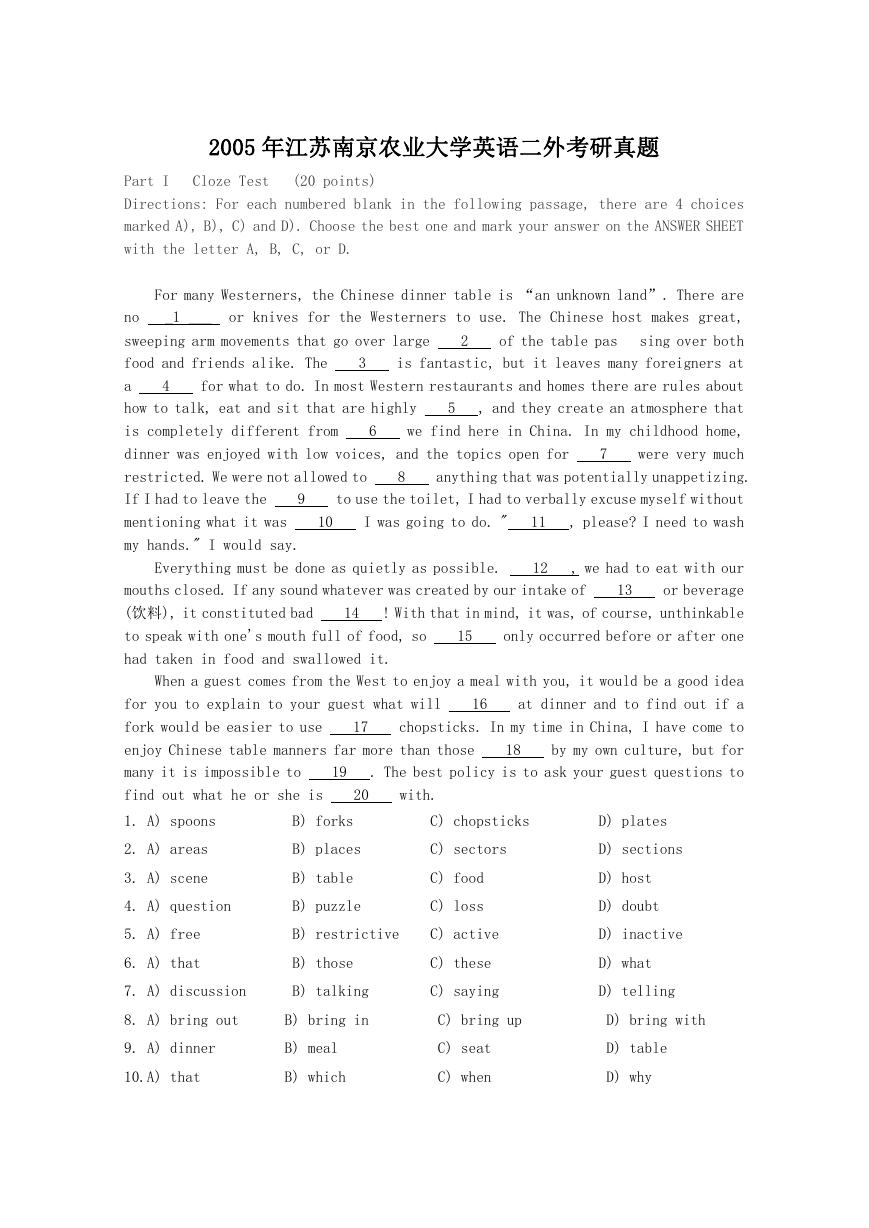
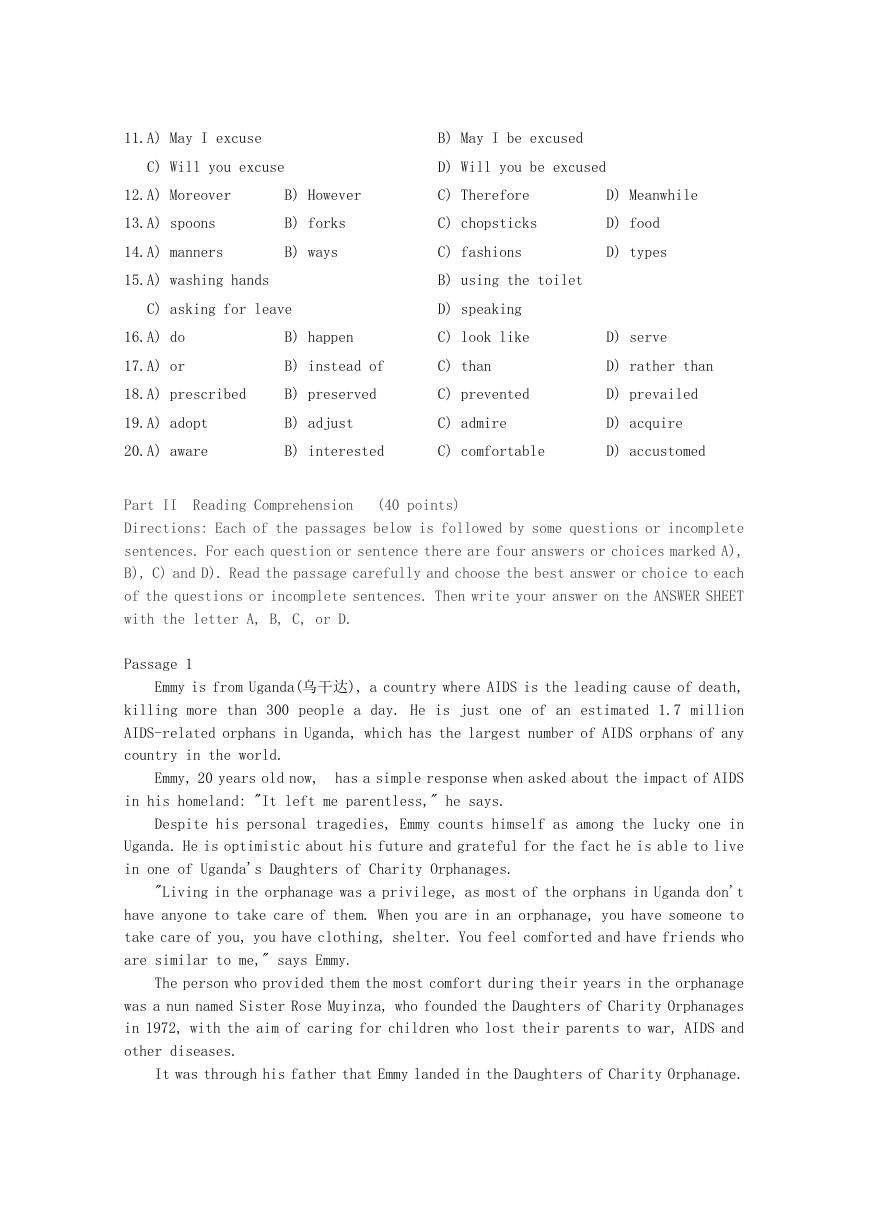
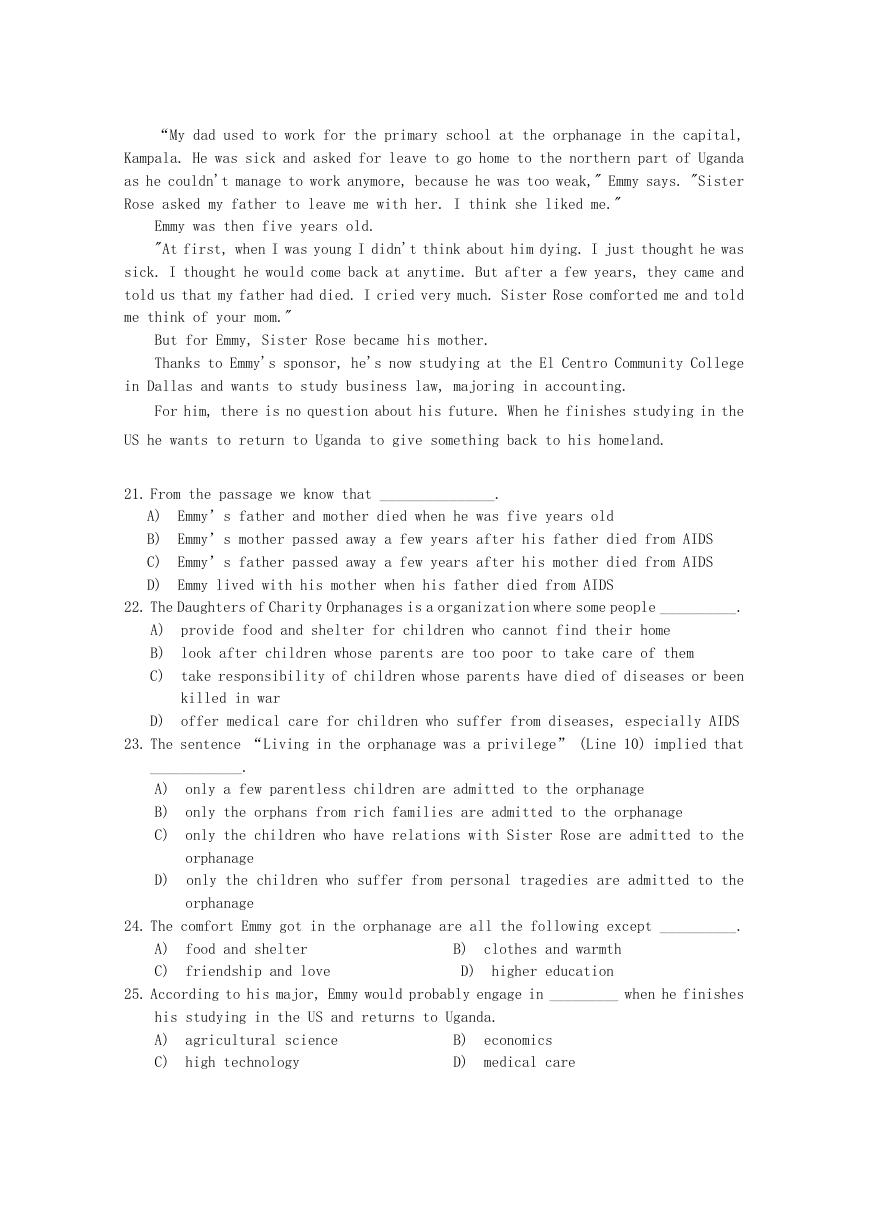
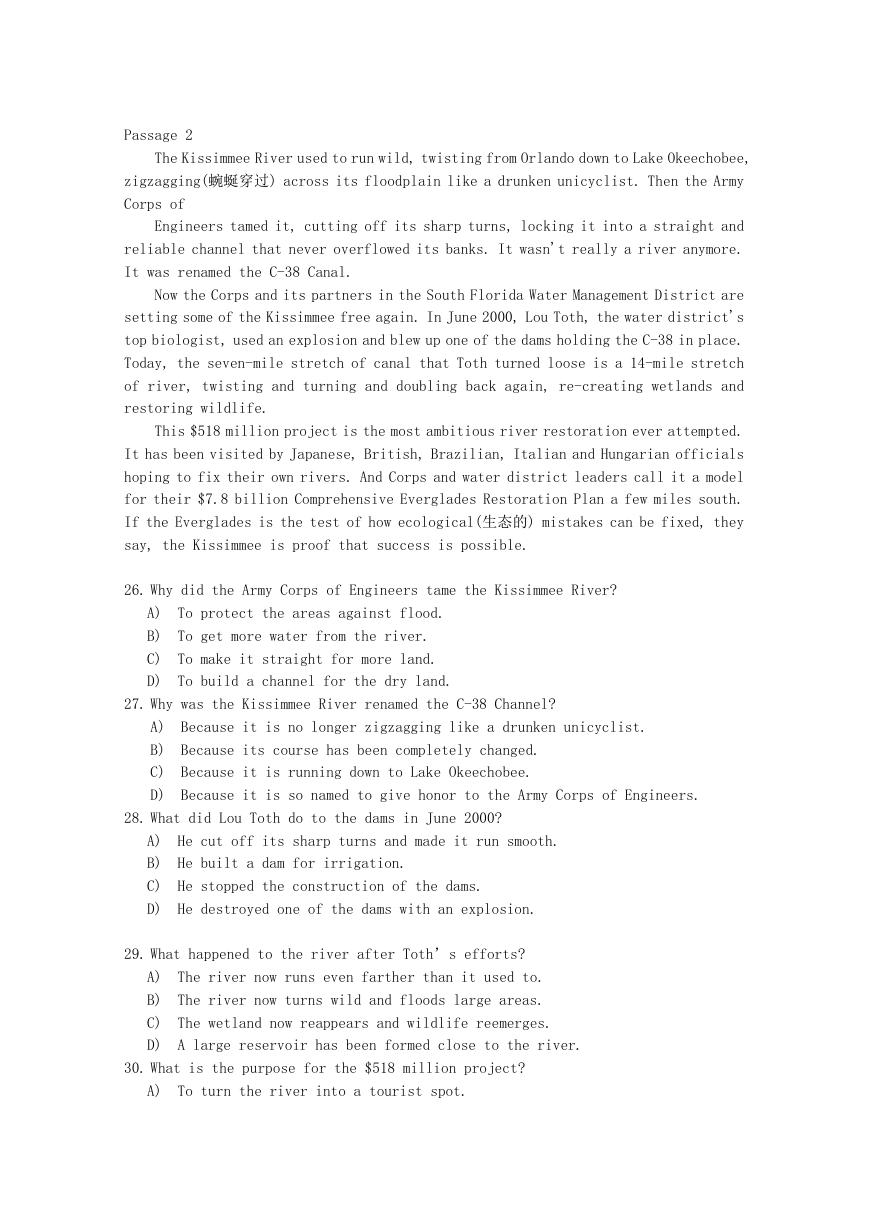
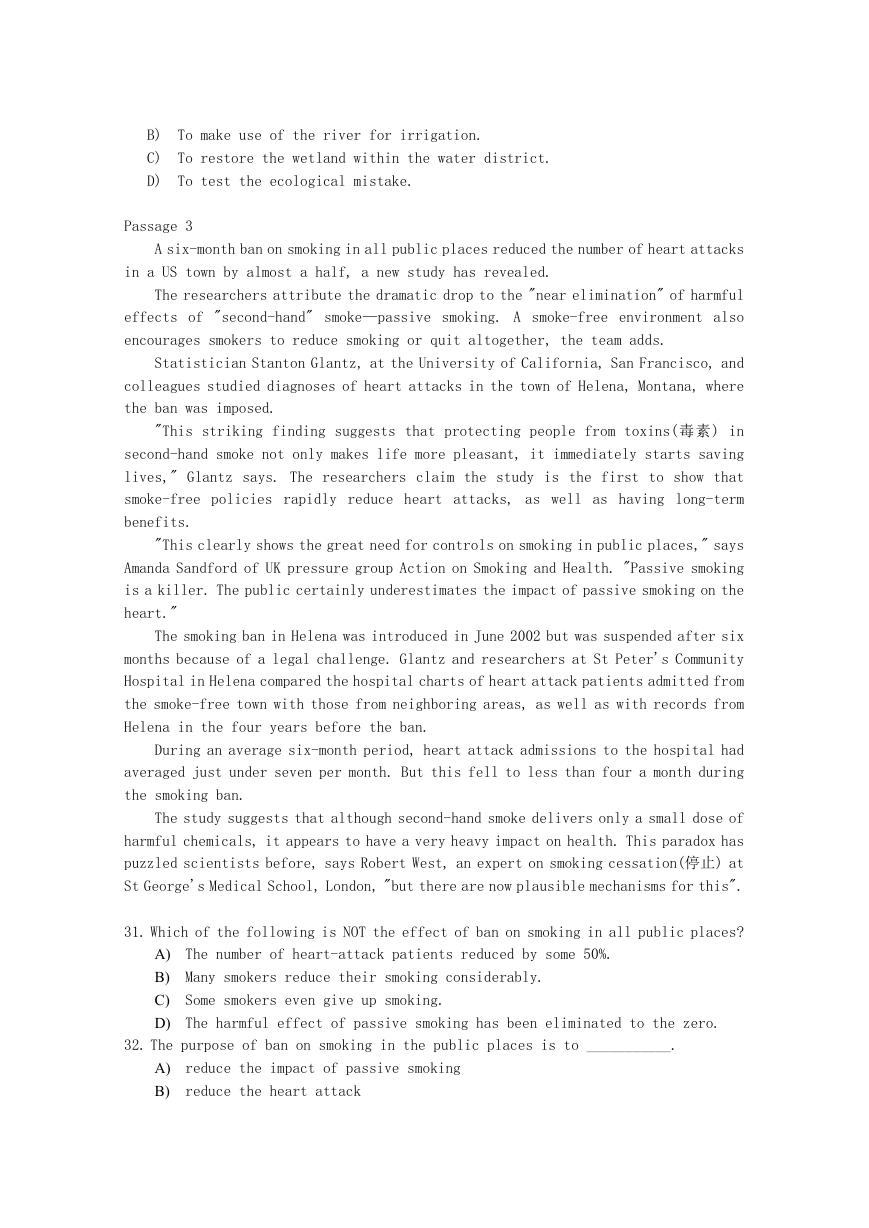
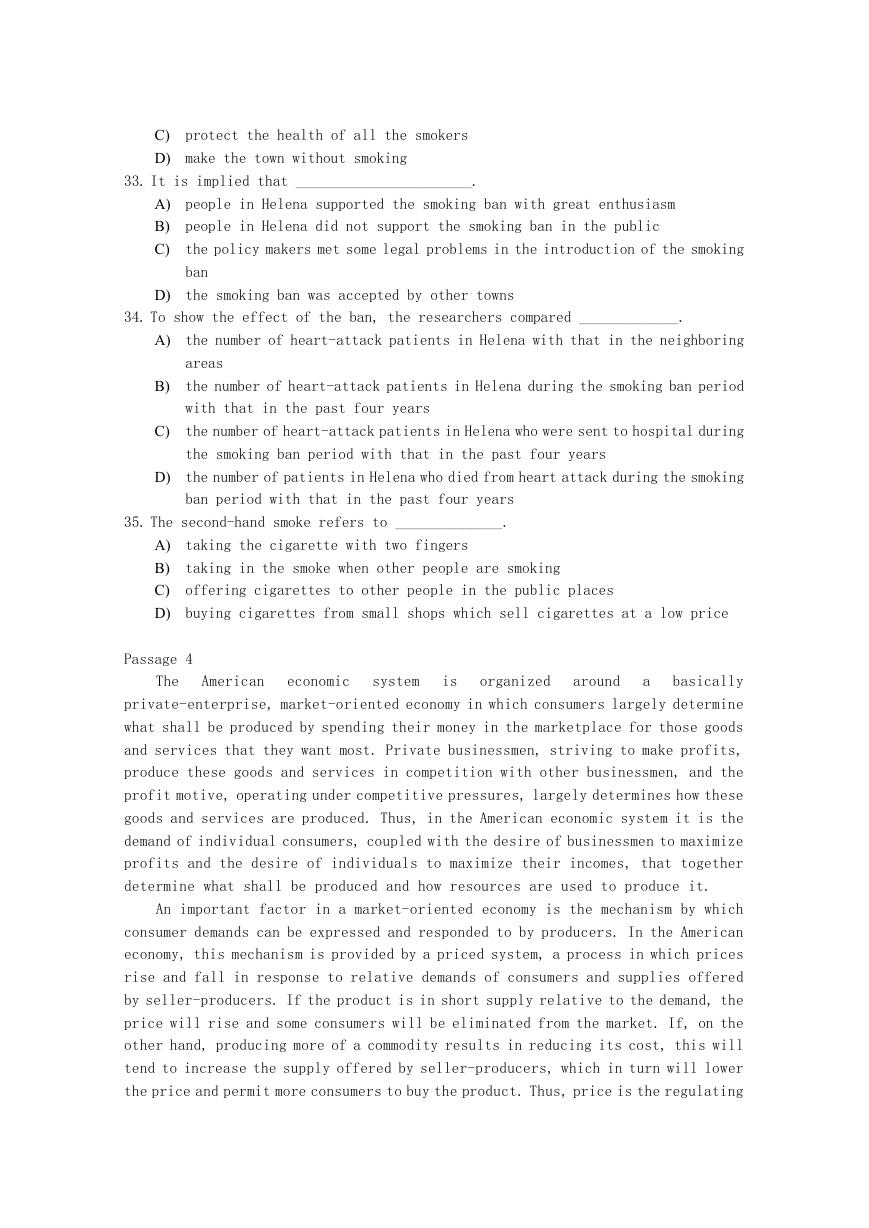
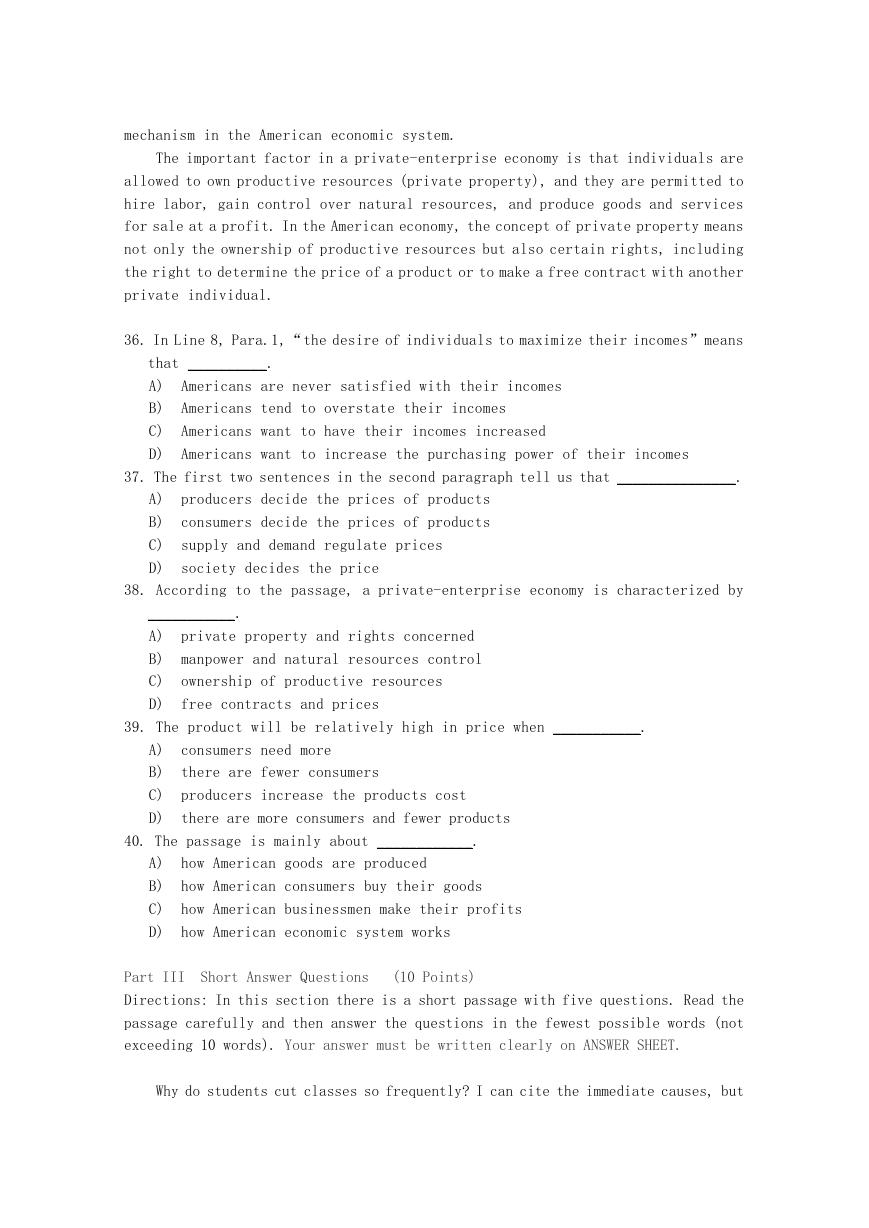
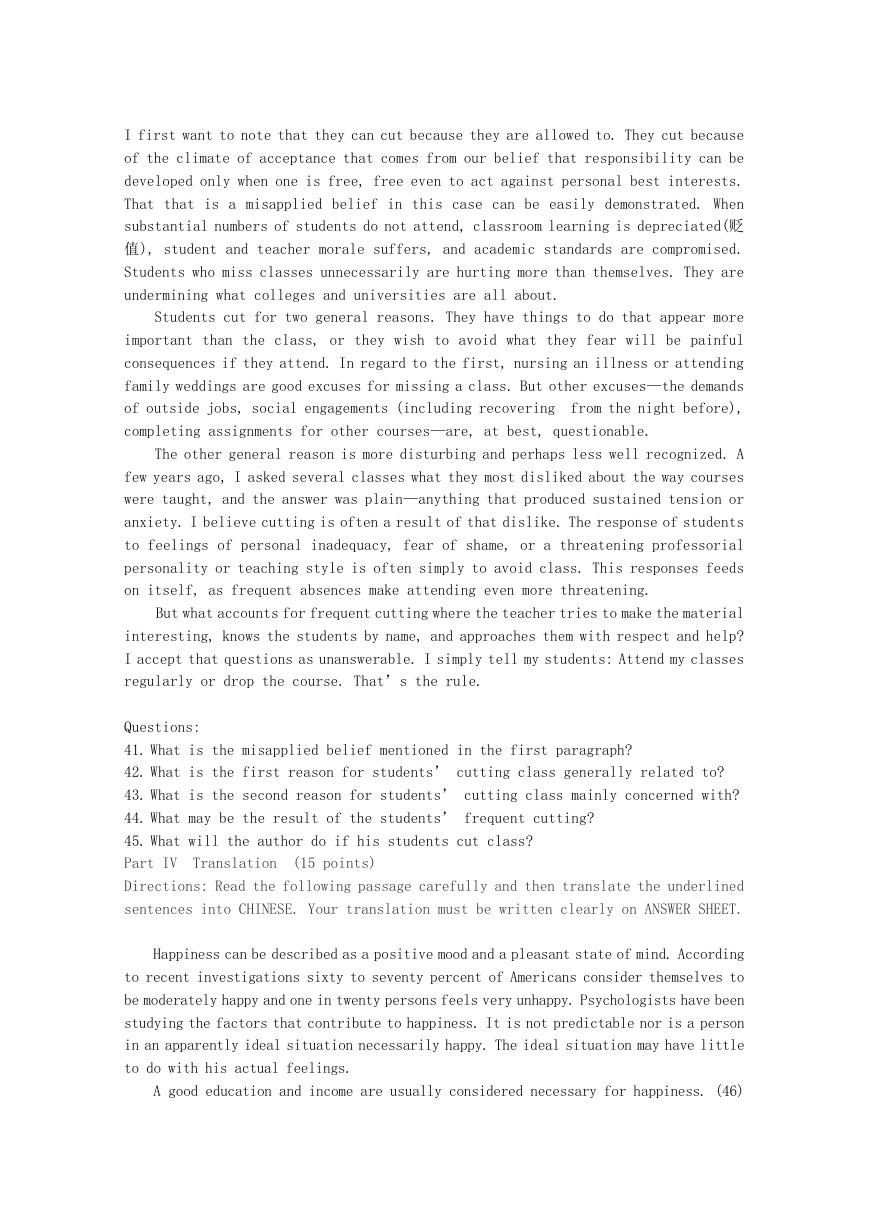








 2023年江西萍乡中考道德与法治真题及答案.doc
2023年江西萍乡中考道德与法治真题及答案.doc 2012年重庆南川中考生物真题及答案.doc
2012年重庆南川中考生物真题及答案.doc 2013年江西师范大学地理学综合及文艺理论基础考研真题.doc
2013年江西师范大学地理学综合及文艺理论基础考研真题.doc 2020年四川甘孜小升初语文真题及答案I卷.doc
2020年四川甘孜小升初语文真题及答案I卷.doc 2020年注册岩土工程师专业基础考试真题及答案.doc
2020年注册岩土工程师专业基础考试真题及答案.doc 2023-2024学年福建省厦门市九年级上学期数学月考试题及答案.doc
2023-2024学年福建省厦门市九年级上学期数学月考试题及答案.doc 2021-2022学年辽宁省沈阳市大东区九年级上学期语文期末试题及答案.doc
2021-2022学年辽宁省沈阳市大东区九年级上学期语文期末试题及答案.doc 2022-2023学年北京东城区初三第一学期物理期末试卷及答案.doc
2022-2023学年北京东城区初三第一学期物理期末试卷及答案.doc 2018上半年江西教师资格初中地理学科知识与教学能力真题及答案.doc
2018上半年江西教师资格初中地理学科知识与教学能力真题及答案.doc 2012年河北国家公务员申论考试真题及答案-省级.doc
2012年河北国家公务员申论考试真题及答案-省级.doc 2020-2021学年江苏省扬州市江都区邵樊片九年级上学期数学第一次质量检测试题及答案.doc
2020-2021学年江苏省扬州市江都区邵樊片九年级上学期数学第一次质量检测试题及答案.doc 2022下半年黑龙江教师资格证中学综合素质真题及答案.doc
2022下半年黑龙江教师资格证中学综合素质真题及答案.doc